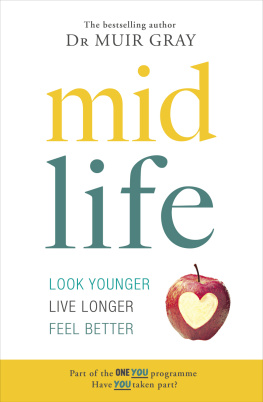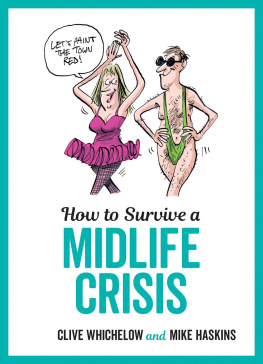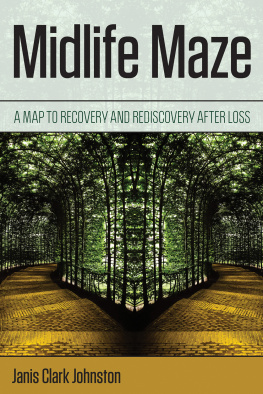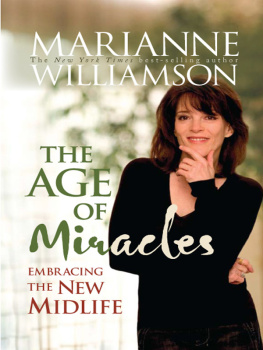but it must be lived forwards.
I t was a snowy New York City winter day, and I was hoping it was the last one of the season. My hair was pulled back in a ponytail, I had no makeup on, and I was wearing my signature Saturday outfita sweater, leggings, and bootsas I ran around my neighborhood doing errands. At the cash register at my local wine shop, the young man behind the counter asked to see my ID. He must have been in his twenties. I was pleasantly shocked. I said incredulously, Really? but I was smiling to myself, I could be your mother. The man looked a little scared by my reaction, and he said softly and almost apologetically, Im sorry. I just cant tell how old you are, so I need to see your ID. I handed over my ID and then told him proudly, Even though Im only five feet one inch tall, Im almost fifty years old. You made my day.
I learned a life lesson that day: if I have a youthful mindset, a pair of leggings, and apparently a ponytail, age may be just a number. And my number doesnt seem to carry the same weight it did in the past. Every once in a while, I might even get carded.
This is why when I hear the term middle-aged its hard to know how to respond. Although weve been conditioned to think its practically a four-letter word, the realities of women in midlife today are far different from what our mothers experienced. The truth is, women in their forties, fifties, and even sixties are living younger, vibrant lives. More important, instead of feeling that the best days of their lives are over, they can fill this unique time with promise and potential, even adventure.
Women in midlife are definitely not experiencing the universal malaise some would call a midlife crisis. The traditional life shifts or passages we used to associate with middle age are no longer occurring on the same timeline for every woman like they did for our mothers and grandmothers. Not all of us are dealing with the empty-nest syndrome because our kids have left home. Instead, some of us in our forties and fifties are still busy raising toddlers, while others have tweens, teenagers, or even grandchildren. Some are just having their first child, or have chosen not to have children at all. We might be reaching the pinnacle of a long career, or reentering the workforce. And our relationships are all at different stages: married, divorced, dealing with the death of a spouse, caring for aging parentsthe list goes on and on. Thats why I see this new midlife as a time of challenging transitions as well as fantastic possibilities, and not just a time of crisis.
No matter where we are in checking off the goals of a life well lived, those of us in midlife are now at the age when we can use the wisdom weve secured to rebalance and reinvent: taking stock of what we have accomplished and continuing to dream big about whats in store. Our future is really looking good. So why are we still beating ourselves up, living with anxiety, and, overall, feeling so bad?
THE NEGATIVITY PRESSURE COOKER
Women in midlife feel bad about themselves for a variety of reasons. Ironically, the downer cultural concept of middle-aged is actually a relatively new one. Until the term midlife was first used in 1807, the chronological period that spanned the middle years of a lifetime was seen as the prime of life. Yet somewhere along the way middle-aged became a label loaded with pessimism: old, over the hill, getting up there, out of it, not with it, losing itwhether it was our marbles, our job, our spouse, or our looks. Language has power and can be brutal to our ego. Whats more, this perception has been infused in the culture so thoroughly that according to a report from the Centers for Disease Control and Prevention, women between the ages of forty and fifty-nine have the highest rate of depression (12.3 percent) of any group based on age and gender in the United States.
In the past, women talked about midlife in terms of crisis or retirement. Weve grown up surrounded by that message and subconsciously adopted those same themes. Many in our parents generation stopped working in their fifties or sixties and were suddenly left with not much to do. So its no surprise their version of middle age was a transition from hectic work and overwhelming familial responsibilities to a depressingly slower lifestyle, complete with rocking chairs. This model of midlife was often compared to the changes a womans body experiences during menopause, which in fact was also treated not as a stage in life but as a disease. Whether these women were contemplating their mental function or their hormonal output, the results typically pointed to one word: decline!
Our culture continues to overidealize youth to the exclusion of other life stages. After decades of cultural brainwashing, the pervasive imagery of youth as perfection makes it hard for women at any age, but especially at midlife, to find their positive, best self and even harder to find their groove. Worse, we create an internal dialogue of self-criticism based on unrealistic comparisons, which keeps us from seeing ourselves accurately and taking advantage of our strengths. For example, a 2014 study proved how perceptions of age are sometimes more convincing than reality. Researchers from Yale University and University of California, Berkeley, found that people who felt and believed they looked young were more effective during exercise than a similarly aged group who actually had worked out for the previous six months. Imagine, then, what negative thinking is doing to the way you perceive your limitations and your future.
During midlife, many women begin to feel negatively defined by society, through external forces like work, dating sites, or the mediaover all of which the typical woman has little control. Midlife is a time in our lives when we begin to rethink the life choices weve made, evaluate our impact on others, and decide what we want to do with the rest of our lifes journey. These thoughts often surface because, for many of us, this is the first time we contemplate or confront our own mortality. By this time weve come to understand the finalities of life, and all the anxieties that creep up can collide with our internal timeline.
Societys fascination with youth leaves some women at midlife feeling anxious and out of control. This anxiety is often based on fearthe fear that as we age we wont be relevant in a world geared toward young people; the fear that we wont have options; or the fear that its simply too late for us to have the life weve always dreamed of. These fears may be triggered by our very natural instinct to fast-forward all the way to old age from the place we are now. When we focus on decline at midlife, were really worrying about what life will be like when were eighty, entirely skipping the stage were in. As a result, too soon we can inadvertently give up on ourselves and our potential for enjoying a great life.
The singular experience of midlife crisis is also a myth. Instead, there are many mini-crises along the timeline of life. Some of them first hit in our teens, more hit in our twenties, and they continue throughout our lifetime. They are part of life and part of growing and changing, period! Theres no avoiding them. So when you notice that youre now questioning yourself more about your life, dont be surprised. Its typical and totally normal to have some fear and concern about how other people perceive you and what opportunities are still out there.
Each crisis at other times in your life will have a different focus. In your teens, it might be figuring out who you are and finding your independence. During your twenties and thirties, youre dwelling on whether youll be able to meet your life goals, personally and professionally. In midlife, the crisis is more holistic: Did you make the right choices, and if you didnt, is it too late to fulfill your desires and dreams? Whats more, at this stage fear surrounds the perception of irrelevancethe fear of missing out or of being overlooked entirely.






